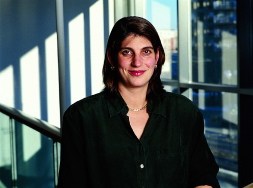Most people think of the human heart as a fist-sized, valve-studded chunk of muscle, a pump bright red as Superman's cape and nearly as strong as the man of steel himself. After all, it generally keeps squeezing for more than 70 years. But Americans are realizing that their hearts may be the weakest link--that part of their bodies most likely to fail.
 |
| Laura Kubzansky has found a link between heart disease and "explanatory style." |
| Photograph by Stu Rosner |
Heart disease kills more Americans annually than any other ailment. Medical researchers currently strain to reverse the trend. But recently some new hope has appeared, from the annals of folk wisdom. According to Laura D. Kubzansky, M.P.H. '97, assistant professor of health and social behavior at the Harvard School of Public Health, optimism--confidence and a positive outlook on personal experiences--may be as heart-helpful as any drug or fat-free diet.
From the Veterans Affairs Normative Aging Study--a multidisciplinary medical project that has followed 2,280 Boston-area men, most of them veterans of World War II or the Korean War, since 1963--Kubzansky selected a cohort of 1,306 men who completed the Minnesota Multiphasic Personality Inventory (MMPI), a clinical personality test, in 1986 and did not at that time have heart disease. She found that men whom the test results identified as "optimistic" were about half as likely to develop heart disease as men defined as pessimistic. For researchers exploring the mind-body connection, this is powerful news. It is all the more persuasive because Kubzansky ruled out other risk factors associated with heart disease, like smoking, heredity, and high blood pressure. "People have this folk theory about the power of positive thinking," Kubzansky says. "I think finally we have some evidence that takes it out of the realm of folklore and into science."
Kubzansky's research, published in Psychosomatic Medicine, separated the men into groups of optimists, pessimists, and neutral, or "balanced," individuals. Each group constituted roughly one-third of the total cohort. During the decade following their personality test, 162 of the men developed heart disease in the forms of nonfatal myocardial infarction, angina pectoris, and fatal coronary heart disease. Kubzansky's data show that about 17 percent of the pessimists developed some form of heart disease, as compared to 12 percent of the "balanced" men and only 8 percent of the optimists. Probing further, Kubzansky found that the optimists were generally better educated and tended to consume less alcohol than the pessimists.
To define optimism and pessimism, Kubzansky used the concept of "explanatory style," formulated by noted University of Pennsylvania psychologist Martin Seligman, as identified by the MMPI. Optimists explain negative events in their lives as due to transient, external factors that are specific to the immediate circumstances. In contrast, pessimists tend to explain such setbacks as caused by stable factors with an internal locus (i.e., their "own fault") and a global aspect that applies across a wide range of situations, generating an ongoing tide of bad luck. In the case of positive events, of course, the explanatory styles are reversed.
The strength of the mental muscle of optimism amazed Kubzansky. "I thought there would be an effect, but I thought it would be much smaller and harder to see," she says. "[This] cuts your risk in half." While the mechanism of optimism's buoyant effect is unclear, Kubzansky's research may help health models evolve. Negative emotions, she explains, currently carry more medical weight--for example, in the preponderance of research on how depression affects physical health. Kubzansky wants to explore the role of positive emotions. "The picture's not all bad," she says. "We spend a lot of time thinking about stress and depression. But the idea that it's not just the absence of the negative, but the presence of the positive, is important."
~Neil Shea
Laura Kubzansky e-mail address: lkubzans@hsph.harvard.edu





